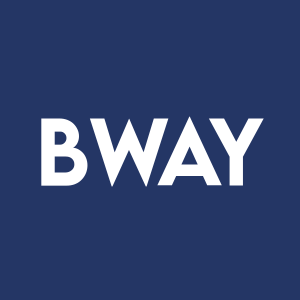BrainsWay Reports Positive Independent Pilot Data on Accelerated Deep TMS Treatment of Alcohol Use Disorder
Rhea-AI Summary
BrainsWay (NASDAQ & TASE: BWAY) announced positive pilot data from an independent Stanford University study evaluating an accelerated Deep Transcranial Magnetic Stimulation (TMS) protocol for alcohol use disorder (AUD) treatment. The study, comparing 5 patients treated with BrainsWay's H7-Coil against 39 patients receiving other treatments, showed significant improvements including:
- Lower heavy drinking days (3% vs 22%)
- Reduced regular drinking days (15% vs 28%)
- Lower relapse rates (60% vs 74%)
Following the publication, the NIH awarded $1.5 million to the research team to explore Deep TMS efficacy in treating substance use addictions. The technology is not yet FDA-cleared for AUD treatment.
Positive
- Independent Stanford University study shows promising results for AUD treatment
- Significant reduction in heavy drinking days (3% vs 22%)
- Lower relapse rates compared to traditional treatments (60% vs 74%)
- Secured $1.5 million NIH grant for further substance use addiction research
Negative
- Deep TMS not yet FDA-cleared for AUD treatment
- Small sample size in pilot study (only 5 patients in treatment group)
News Market Reaction 1 Alert
On the day this news was published, BWAY declined 0.82%, reflecting a mild negative market reaction.
Data tracked by StockTitan Argus on the day of publication.
BURLINGTON, Mass. and JERUSALEM, Dec. 12, 2024 (GLOBE NEWSWIRE) -- BrainsWay Ltd. (NASDAQ & TASE: BWAY) (“BrainsWay” or the “Company”), a global leader in the advanced non-invasive treatment of brain disorders, today announced recent positive pilot data from an independent, third-party study conducted at Stanford University evaluating an accelerated protocol using the Company’s Deep Transcranial Magnetic Stimulation (TMS) technology to treat alcohol use disorder (AUD) patients. The outcomes were reported in a publication in the Brain Stimulation journal entitled, “Accelerated deep TMS in alcohol use disorder: A preliminary pilot trial targeting the dorsal anterior cingulate cortex increases neural target engagement and abstinence.”
The study compared outcomes achieved in a residential treatment program on a group of AUD patients treated with BrainsWay’s H7-Coil (n=5) using an “accelerated” protocol of multiple sessions of Deep TMS per day over several days, with those achieved in a previously collected sample of data from patients in the same program (n=39) who had undergone other forms of treatment not involving Deep TMS. In the follow-up period after treatment, subjects receiving accelerated Deep TMS showed notably better improvements when compared to those treated by other means. The better outcomes were seen in several important areas, including lower percentages of heavy drinking days (
Shortly following publication of the pilot study, the U.S. National Institutes of Health (NIH) awarded approximately
“Alcohol Use Disorder (AUD) affects millions worldwide, leading to significant personal and societal challenges,” said Hadar Levy, CEO of BrainsWay. “Innovative treatments are crucial to support long-term recovery. We believe these promising preliminary results pave the way for further research into the potential benefits of treating AUD and other addictions with Deep TMS.”
BrainsWay Deep TMS is not currently cleared by the FDA for the safe or effective treatment of AUD.
About BrainsWay
BrainsWay is a global leader in advanced noninvasive neurostimulation treatments for mental health disorders. The Company is boldly advancing neuroscience with its proprietary Deep Transcranial Magnetic Stimulation (Deep TMS™) platform technology to improve health and transform lives. BrainsWay is the first and only TMS company to obtain three FDA-cleared indications backed by pivotal clinical studies demonstrating clinically proven efficacy. Current indications include major depressive disorder (including reduction of anxiety symptoms, commonly referred to as anxious depression), obsessive-compulsive disorder, and smoking addiction. The Company is dedicated to leading through superior science and building on its unparalleled body of clinical evidence. Additional clinical trials of Deep TMS in various psychiatric, neurological, and addiction disorders are underway. Founded in 2003, with operations in Israel and the U.S., BrainsWay is committed to increasing global awareness of and broad access to Deep TMS. For the latest news and information about BrainsWay, please visit www.brainsway.com.
Forward-Looking Statement
This press release contains “forward-looking statements” within the meaning of the Private Securities Litigation Reform Act of 1995. Such statements may be preceded by the words “intends,” “may,” “will,” “plans,” “expects,” “anticipates,” “projects,” “predicts,” “estimates,” “aims,” “believes,” “hopes,” “potential” or similar words. These forward-looking statements and their implications are based on the current expectations of the management of the Company only and are subject to a number of factors and uncertainties that could cause actual results to differ materially from those described in the forward-looking statements. In addition, historical results or conclusions from scientific research and clinical studies do not guarantee that future results would suggest similar conclusions or that historical results referred to herein would be interpreted similarly in light of additional research or otherwise. The following factors, among others, could cause actual results to differ materially from those described in the forward-looking statements: inadequacy of financial resources to meet future capital requirements; changes in technology and market requirements; delays or obstacles in launching and/or successfully completing planned studies and clinical trials; failure to obtain approvals by regulatory agencies on the Company’s anticipated timeframe, or at all; inability to retain or attract key employees whose knowledge is essential to the development of Deep TMS products; unforeseen difficulties with Deep TMS products and processes, and/or inability to develop necessary enhancements; unexpected costs related to Deep TMS products; failure to obtain and maintain adequate protection of the Company’s intellectual property, including intellectual property licensed to the Company; the potential for product liability; changes in legislation and applicable rules and regulations; unfavorable market perception and acceptance of Deep TMS technology; inadequate or delays in reimbursement from third-party payers, including insurance companies and Medicare; inability to commercialize Deep TMS, including internationally, by the Company or through third-party distributors; product development by competitors; inability to timely develop and introduce new technologies, products and applications, which could cause the actual results or performance of the Company to differ materially from those contemplated in such forward-looking statements.
Any forward-looking statement in this press release speaks only as of the date of this press release. The Company undertakes no obligation to publicly update or review any forward-looking statement, whether as a result of new information, future developments or otherwise, except as may be required by any applicable securities laws. More detailed information about the risks and uncertainties affecting the Company is contained under the heading “Risk Factors” in the Company’s filings with the U.S. Securities and Exchange Commission.
Contacts:
BrainsWay:
Ido Marom
Chief Financial Officer
Ido.Marom@BrainsWay.com
Investors:
Brian Ritchie
LifeSci Advisors LLC
britchie@lifesciadvisors.com








